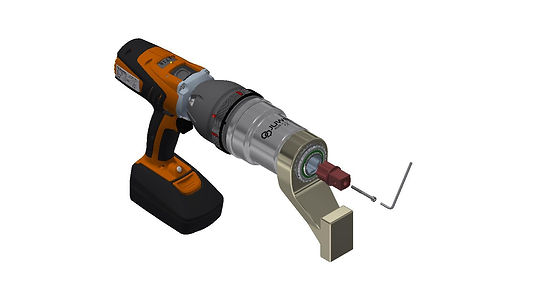Product innovation:
Interchangeable square insert
Location: Wissen an der Sieg - Published on: 21.06.2024 - Author: F. Berger

All JUWEL torque wrenches can now be fitted with an interchangeable square drive. This is possible for all drives: battery, electric, pneumatic or mechanical. Existing devices can also be optionally converted according to customer requirements.
This innovation gives you maximum flexibility:
-
Adapt your square drive to your sockets within the maximum permissible torque values
-
If a square drive breaks off due to incorrect support or is destroyed by material fatigue and/or overload, you can now replace it yourself. Don't send the tool back and carry out the service yourself
-
Save costs for breakdowns, transport or spare parts
In addition, the JUWEL torque wrenches are now available in new performance classes (e.g. the TQS-130 is now also available with an optional 3/4" drive or the TQS-380 with a 1" drive). Further details will be available soon on the respective product pages.
The benefits of self-repair: more than just cost savings
At a time when consumerism and a throwaway mentality are widespread, the ability to repair things yourself is becoming increasingly important. Whether it's household appliances, furniture, vehicles or electronic devices - self-repairs offer numerous advantages that go far beyond mere cost savings.
1. Cost savings
The most obvious benefit of self-repairs is the reduction in costs. Professional repairs can be expensive, especially when it comes to small problems that can be easily fixed with a little know-how and the right tools. By doing it yourself, you not only save on labour costs, but often also on the mark-up on spare parts.
2. Environmental friendliness
DIY repairs contribute significantly to reducing waste. Instead of throwing away defective appliances or furniture and buying new ones, you extend their lifespan. This reduces resource consumption and the ecological footprint. In addition, less production and transport of new goods reduces CO₂ emissions.
3. Independence and competence
Learning repair skills boosts self-confidence and promotes independence. They are no longer reliant on external service providers and can tackle problems immediately. This knowledge can also be transferred to other areas of life, promoting an overall more practical and resource-orientated mindset.
4. Time saving
Although it may seem time-consuming at first, doing it yourself can ultimately save you time. You don't have to wait for an appointment with the repair service or spend time transporting the item to and from the repair service. With the right skills and tools, many repairs can be completed quickly and efficiently.
Conclusion
The ability to repair things yourself offers numerous benefits that go far beyond financial savings. It promotes sustainability, independence and competence, saves time and supports the local economy. It also helps to educate and pass on valuable skills. In a world that increasingly favours quick fixes and disposable products, self-repair is an important and rewarding alternative that enriches both the individual and society as a whole.
